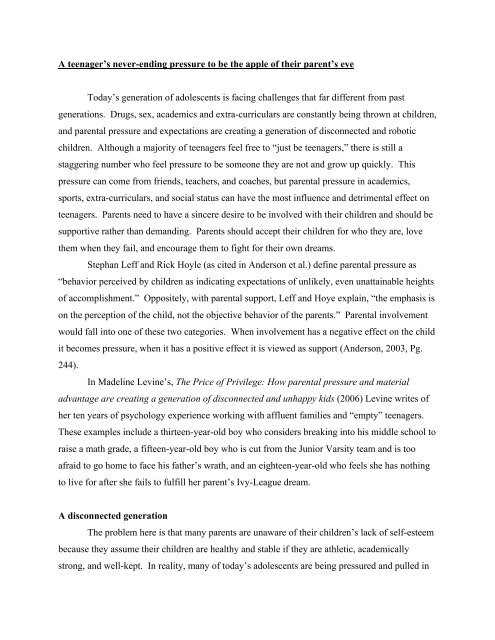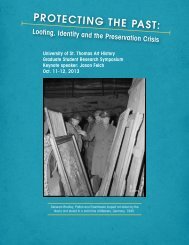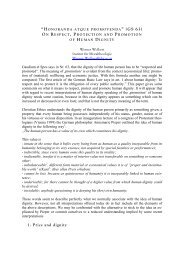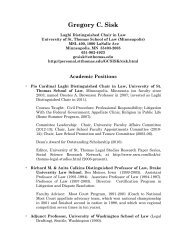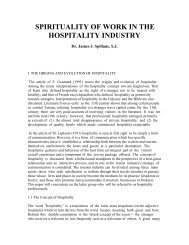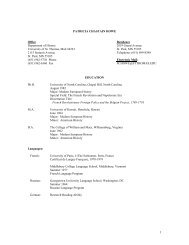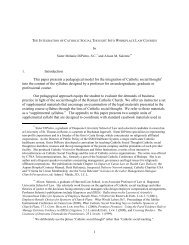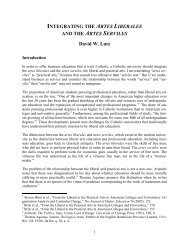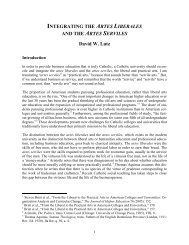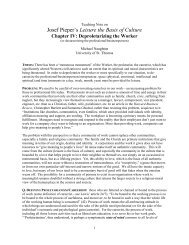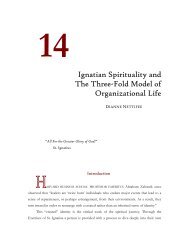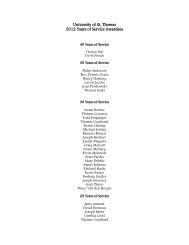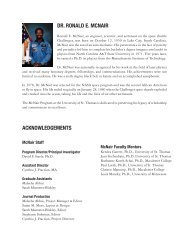A teenager's never-ending pressure to be the apple of their parent's ...
A teenager's never-ending pressure to be the apple of their parent's ...
A teenager's never-ending pressure to be the apple of their parent's ...
You also want an ePaper? Increase the reach of your titles
YUMPU automatically turns print PDFs into web optimized ePapers that Google loves.
A teenager’s <strong>never</strong>-<strong>ending</strong> <strong>pressure</strong> <strong>to</strong> <strong>be</strong> <strong>the</strong> <strong>apple</strong> <strong>of</strong> <strong>the</strong>ir parent’s eye<br />
Today’s generation <strong>of</strong> adolescents is facing challenges that far different from past<br />
generations. Drugs, sex, academics and extra-curriculars are constantly <strong>be</strong>ing thrown at children,<br />
and parental <strong>pressure</strong> and expectations are creating a generation <strong>of</strong> disconnected and robotic<br />
children. Although a majority <strong>of</strong> teenagers feel free <strong>to</strong> “just <strong>be</strong> teenagers,” <strong>the</strong>re is still a<br />
staggering num<strong>be</strong>r who feel <strong>pressure</strong> <strong>to</strong> <strong>be</strong> someone <strong>the</strong>y are not and grow up quickly. This<br />
<strong>pressure</strong> can come from friends, teachers, and coaches, but parental <strong>pressure</strong> in academics,<br />
sports, extra-curriculars, and social status can have <strong>the</strong> most influence and detrimental effect on<br />
teenagers. Parents need <strong>to</strong> have a sincere desire <strong>to</strong> <strong>be</strong> involved with <strong>the</strong>ir children and should <strong>be</strong><br />
supportive ra<strong>the</strong>r than demanding. Parents should accept <strong>the</strong>ir children for who <strong>the</strong>y are, love<br />
<strong>the</strong>m when <strong>the</strong>y fail, and encourage <strong>the</strong>m <strong>to</strong> fight for <strong>the</strong>ir own dreams.<br />
Stephan Leff and Rick Hoyle (as cited in Anderson et al.) define parental <strong>pressure</strong> as<br />
“<strong>be</strong>havior perceived by children as indicating expectations <strong>of</strong> unlikely, even unattainable heights<br />
<strong>of</strong> accomplishment.” Oppositely, with parental support, Leff and Hoye explain, “<strong>the</strong> emphasis is<br />
on <strong>the</strong> perception <strong>of</strong> <strong>the</strong> child, not <strong>the</strong> objective <strong>be</strong>havior <strong>of</strong> <strong>the</strong> parents.” Parental involvement<br />
would fall in<strong>to</strong> one <strong>of</strong> <strong>the</strong>se two categories. When involvement has a negative effect on <strong>the</strong> child<br />
it <strong>be</strong>comes <strong>pressure</strong>, when it has a positive effect it is viewed as support (Anderson, 2003, Pg.<br />
244).<br />
In Madeline Levine’s, The Price <strong>of</strong> Privilege: How parental <strong>pressure</strong> and material<br />
advantage are creating a generation <strong>of</strong> disconnected and unhappy kids (2006) Levine writes <strong>of</strong><br />
her ten years <strong>of</strong> psychology experience working with affluent families and “empty” teenagers.<br />
These examples include a thirteen-year-old boy who considers breaking in<strong>to</strong> his middle school <strong>to</strong><br />
raise a math grade, a fifteen-year-old boy who is cut from <strong>the</strong> Junior Varsity team and is <strong>to</strong>o<br />
afraid <strong>to</strong> go home <strong>to</strong> face his fa<strong>the</strong>r’s wrath, and an eighteen-year-old who feels she has nothing<br />
<strong>to</strong> live for after she fails <strong>to</strong> fulfill her parent’s Ivy-League dream.<br />
A disconnected generation<br />
The problem here is that many parents are unaware <strong>of</strong> <strong>the</strong>ir children’s lack <strong>of</strong> self-esteem<br />
<strong>be</strong>cause <strong>the</strong>y assume <strong>the</strong>ir children are healthy and stable if <strong>the</strong>y are athletic, academically<br />
strong, and well-kept. In reality, many <strong>of</strong> <strong>to</strong>day’s adolescents are <strong>be</strong>ing <strong>pressure</strong>d and pulled in
so many directions, causing <strong>the</strong>m <strong>to</strong> <strong>be</strong> emotionally drained, some <strong>to</strong> <strong>the</strong> point that <strong>the</strong>y have lost<br />
<strong>the</strong>ir sense <strong>of</strong> passion and self-worth.<br />
When parents, teachers and coaches are constantly telling kids <strong>be</strong> <strong>the</strong> <strong>be</strong>st student, throw<br />
<strong>the</strong> ball fur<strong>the</strong>r than anyone, and get ahead at an early age, adults should not <strong>be</strong> doubting <strong>the</strong>m or<br />
punishing <strong>the</strong>m when <strong>the</strong>y fall short <strong>of</strong> high expectations. They are worn out from <strong>be</strong>ing treated<br />
as robots ra<strong>the</strong>r than <strong>the</strong> children <strong>the</strong>y are: constantly <strong>be</strong>ing <strong>to</strong>ld what <strong>to</strong> do, how, and when.<br />
Teenage suicide rates have quadrupled since <strong>the</strong> 1950’s and in <strong>the</strong> past six months alone <strong>the</strong>re<br />
have <strong>be</strong>en outbursts along <strong>the</strong> East Coast <strong>of</strong> groups <strong>of</strong> teenagers expressing a desire <strong>to</strong> kill<br />
<strong>the</strong>mselves <strong>be</strong>cause <strong>the</strong>y feel “worthless” (Levine, 2006, Pg. 7).<br />
Children will develop feelings <strong>of</strong> confidence and self-worth if <strong>the</strong>y are able <strong>to</strong> make<br />
decisions for <strong>the</strong>mselves. Levine explains that when children find a “sense <strong>of</strong> self” <strong>the</strong>y come <strong>to</strong><br />
feel “au<strong>the</strong>ntic and capable” (2006, Pg. 8). Levine argues, “Self-management includes such<br />
skills as self-control, impulse control, frustration <strong>to</strong>lerance, <strong>the</strong> capacity <strong>to</strong> delay gratification,<br />
and <strong>the</strong> ability <strong>to</strong> pay attention.” Parents are usually <strong>the</strong> role models who naturally encourage<br />
this development during <strong>the</strong> transition from a focus on external demands <strong>to</strong> a greater focus on<br />
internal demands. “You need <strong>to</strong> say please and thank-you” <strong>be</strong>comes “I need <strong>to</strong> say please and<br />
thank-you.” When children are constantly <strong>be</strong>ing <strong>to</strong>ld what <strong>to</strong> do <strong>the</strong>y lose <strong>the</strong> chance <strong>to</strong> develop<br />
<strong>the</strong>se imperative skills (Levine, 2006, Pg. 8)<br />
Pressure in sports and extracurriculars<br />
Countless studies explore <strong>the</strong> amount <strong>of</strong> stress that young athletes feel <strong>to</strong> achieve<br />
greatness. Not only are <strong>the</strong>y experiencing peer <strong>pressure</strong> and self-<strong>pressure</strong>, <strong>the</strong>ir coaches are <strong>the</strong>re<br />
<strong>to</strong> purposely critique and push <strong>the</strong>m, <strong>of</strong>ten times resulting in over-exhaustion, emotionally and<br />
physically. This has <strong>be</strong>come <strong>to</strong> <strong>be</strong> known as “burnout.” Adding parental <strong>pressure</strong> only elevates<br />
<strong>the</strong> child’s stress when he or she is attempting <strong>to</strong> live up <strong>to</strong> parental athletic expectations.<br />
Sam Sagar and Joachim S<strong>to</strong>e<strong>be</strong>r explain in <strong>the</strong>ir article Perfectionism, fear <strong>of</strong> failure, and<br />
affective responses <strong>to</strong> success and failure: The central role <strong>of</strong> fear <strong>of</strong> experiencing shame and<br />
embarrassment (2009) that<br />
“Parents are a source <strong>of</strong> perfectionistic concerns through <strong>the</strong>ir high<br />
expectations and critical evaluation <strong>of</strong> <strong>the</strong>ir child, and <strong>the</strong> child’s tendency<br />
<strong>to</strong> place substantial value on <strong>the</strong>ir parents’ evaluation. Parental high
expectations and criticism (or negative evaluation) <strong>of</strong> <strong>the</strong>ir child’s<br />
achievement have <strong>be</strong>en associated with <strong>the</strong> development <strong>of</strong> fear <strong>of</strong> failure<br />
in children and with children’s feelings <strong>of</strong> shame and guilt when not<br />
meeting parental expectations” (Pg. 6).<br />
When coaches and parents use fear, intimidation and shouting, research shows that it<br />
leads <strong>to</strong> “low perceived competence and motivation fear <strong>of</strong> making mistakes, evaluation<br />
apprehension, and high anxiety and worry levels” (Sagar & S<strong>to</strong>e<strong>be</strong>r, 2009, Pg. 5). At this point,<br />
<strong>the</strong> athlete is no longer playing for <strong>the</strong> love <strong>of</strong> <strong>the</strong> game. Ra<strong>the</strong>r, <strong>the</strong> child is playing in fear that<br />
if he does not play or if he makes a mistake, he will <strong>be</strong> punished. (Sagar & S<strong>to</strong>e<strong>be</strong>r, 2009, Pg. 6)<br />
Jennifer Anderson et al. explains what parents should and should not do in extracurricular<br />
involvement in <strong>the</strong>ir article Parental support and <strong>pressure</strong> and children’s extracurricular<br />
activities: relationships with amount <strong>of</strong> involvement and affective experience <strong>of</strong> participation<br />
(2003). Parents should <strong>be</strong> a source <strong>of</strong> encouragement for <strong>the</strong>ir children while still letting <strong>the</strong>m<br />
make some <strong>of</strong> <strong>the</strong> decisions on <strong>the</strong>ir own. For example, parents should allow <strong>the</strong>ir children <strong>to</strong><br />
decide what activities <strong>to</strong> participate in and <strong>the</strong> amount <strong>of</strong> involvement <strong>the</strong>y want <strong>to</strong> exert. This<br />
will lead children <strong>to</strong> enjoy <strong>the</strong>ir activities more and motivate <strong>the</strong>m <strong>to</strong> participate. “Children who<br />
do not enjoy <strong>the</strong>ir extracurricular activities may also <strong>be</strong> less likely <strong>to</strong> reap o<strong>the</strong>r associated<br />
<strong>be</strong>nefits, such as skill development and positive peer interaction” (Anderson, et al., 2003, Pg.<br />
253)<br />
Parents should not show high levels <strong>of</strong> disappointment in <strong>the</strong>ir child since this will cause<br />
<strong>the</strong> child <strong>to</strong> lose enjoyment and motivation in <strong>the</strong> activity. Parents should remem<strong>be</strong>r <strong>to</strong> place<br />
<strong>the</strong>ir children’s needs ahead <strong>the</strong>ir own. For example, parents should not put <strong>pressure</strong> on <strong>the</strong>ir<br />
children <strong>to</strong> bring in a source <strong>of</strong> income due <strong>to</strong> <strong>the</strong>ir talent (Anderson, et al., 2003).<br />
Pressure in academics<br />
Although <strong>the</strong> focus here is on early adolescents, it should <strong>be</strong> stated that even in as early as<br />
preschool children are overworked and under extreme <strong>pressure</strong> <strong>to</strong> <strong>be</strong> academically successful.<br />
The results from Kathy Hirsh’s et al. study on early academic environments suggest that <strong>the</strong>re<br />
are “no academic advantages for children from highly academic environments, and potential<br />
disadvantages in creative expression and emotional well-<strong>be</strong>ing” (Hirsh-Pasek, Hyson, Rescorla,<br />
1990, abstract). The same results appear for middle school and high school aged students.
In 2008, <strong>the</strong> Horatio Alger Association <strong>of</strong> Distinguished Americans, a non-pr<strong>of</strong>it<br />
education group, surveyed 1,006 13 <strong>to</strong> 19-year-olds in its 10 th annual State <strong>of</strong> Our Nation’s Youth<br />
report. The study found that throughout all demographics 80 percent <strong>of</strong> high school students feel<br />
<strong>pressure</strong> <strong>to</strong> get good grades and 38 percent <strong>of</strong> those said that it is <strong>the</strong> biggest stress in <strong>the</strong>ir life.<br />
The study also found that “three-quarters <strong>of</strong> teenagers say that <strong>the</strong>ir parents would <strong>be</strong> more proud<br />
<strong>of</strong> <strong>the</strong>m for receiving straight A’s on <strong>the</strong>ir report cards than for receiving a community service<br />
award” (Horatio Alger, 2008). Ironically, as parental <strong>pressure</strong> has increased since <strong>the</strong> 2005<br />
report, students have still stayed at a B average. Again, <strong>the</strong> question presents itself: when is<br />
<strong>pressure</strong> <strong>to</strong>o much?<br />
Pressure can come in different ways from parents: verbally expressing <strong>the</strong>ir desire for<br />
good grades, yelling or punishing, or silent <strong>pressure</strong> in <strong>the</strong> form <strong>of</strong> disappointment. The<br />
Children’s Press Line reported on three teenagers experiencing <strong>pressure</strong>. 17-year-old Shauna<br />
Staranko remarked on how <strong>pressure</strong> differed from her parents. “My mom's <strong>pressure</strong> is more for<br />
that marking period, for that day, for that week. My dad's more for a common goal in <strong>the</strong> future<br />
for college.” Her mo<strong>the</strong>r also used bribing for good grades, but eventually <strong>the</strong> bribing went<br />
away. However, Staranko admits she <strong>of</strong>ten worked only <strong>to</strong> receive <strong>the</strong> bri<strong>be</strong>s (Staranko, et. al).<br />
Of <strong>the</strong> three children highlighted in <strong>the</strong> Horatio Alger study, all three children expressed<br />
how <strong>the</strong>y already <strong>pressure</strong> <strong>the</strong>mselves <strong>to</strong> do well, and <strong>the</strong>y have parental <strong>pressure</strong> on <strong>to</strong>p <strong>of</strong> that.<br />
When grades can <strong>be</strong> moni<strong>to</strong>red hour-by-hour online with programs such as PowerSchool, it <strong>of</strong>ten<br />
leads children <strong>to</strong> <strong>be</strong> punished for poor grades <strong>be</strong>fore <strong>the</strong>y even have time <strong>to</strong> come home and<br />
explain <strong>to</strong> <strong>the</strong>ir parents <strong>the</strong>ir sub par grade. Certainly it is important for parents <strong>to</strong> <strong>be</strong> aware <strong>of</strong><br />
<strong>the</strong>ir child’s progress, but this intense moni<strong>to</strong>ring can turn children away from a true love <strong>of</strong><br />
learning (Levine, 2006, Pg. 28).<br />
The effect <strong>of</strong> <strong>the</strong> all powerful dollar – or lack <strong>the</strong>re <strong>of</strong><br />
Levine takes an inside look at <strong>the</strong> lives <strong>of</strong> U.S. teenagers and how wealth and parental<br />
<strong>pressure</strong>s have played a large role in <strong>the</strong>ir discontent. Straight A’s and sports scholarships cover<br />
up <strong>the</strong> depression, stress, and anger many <strong>of</strong> <strong>the</strong>se teenagers are feeling. This is what Levine<br />
descri<strong>be</strong>s as <strong>the</strong> “paradox <strong>of</strong> privilege” (Levine, 2006).<br />
What startles Levine <strong>the</strong> most is that <strong>the</strong> children are assumed <strong>to</strong> <strong>be</strong> happy due <strong>to</strong> <strong>the</strong>ir<br />
financial status and successful parents. Comfortable lifestyles, lavish homes, and private school
educations are not what teenagers need <strong>to</strong> <strong>be</strong> happy <strong>the</strong>se days and should not la<strong>be</strong>l <strong>the</strong>m as well-<br />
adjusted teenagers. What <strong>the</strong>se privileged children need is love and acceptance from <strong>the</strong>ir<br />
parents, but <strong>to</strong>o <strong>of</strong>ten are taken <strong>of</strong>f <strong>the</strong>ir parents’ priority list or <strong>pressure</strong>d in<strong>to</strong> <strong>be</strong>ing someone<br />
<strong>the</strong>y are not. Unfortunately, wealthy parents can <strong>be</strong> oblivious <strong>to</strong> <strong>the</strong> fact that anything is wrong<br />
with <strong>the</strong>ir children. If <strong>the</strong>y are getting good grades, are well-kept and popular, <strong>the</strong>n what do <strong>the</strong>y<br />
have <strong>to</strong> worry about? In reality, denial and oblivion are preventing parents from looking at <strong>the</strong>ir<br />
own parenting styles (Levine, 2006).<br />
However, it does not take a large paycheck <strong>to</strong> <strong>pressure</strong> children in<strong>to</strong> success and personal<br />
ideals. Children from disadvantaged families are <strong>of</strong>ten expected <strong>to</strong> do well in school in order <strong>to</strong><br />
care for <strong>the</strong>ir siblings and help with <strong>the</strong> bills. 16-year-old Samantha Avenzzano has felt verbal<br />
<strong>pressure</strong> from her parents at a young age. As an only child, Avenzzano has <strong>be</strong>en <strong>to</strong>ld she needs<br />
<strong>to</strong> succeed in order <strong>to</strong> support <strong>the</strong> family with a high power job (Staranko, et. al). Sagar and<br />
S<strong>to</strong>e<strong>be</strong>r (2009) worry that “most parents are probably not aware <strong>of</strong> <strong>the</strong> potency <strong>of</strong> <strong>the</strong>ir<br />
pressuring <strong>be</strong>haviors. Parents may <strong>be</strong>gin with good intentions, trying <strong>to</strong> introduce <strong>the</strong>ir children<br />
<strong>to</strong> sports activities that may ultimately bring <strong>the</strong>m success” (Pg. 9) In <strong>the</strong> end, money is<br />
unfortunately <strong>the</strong> only goal for <strong>the</strong> parent.<br />
Much more than just a parent<br />
The State <strong>of</strong> our Youth report showed that 57 percent <strong>of</strong> teenagers say <strong>the</strong>ir biggest role<br />
model is a family mem<strong>be</strong>r (Horatio Alger, 2008). This is an as<strong>to</strong>nishing num<strong>be</strong>r since <strong>the</strong> next<br />
biggest group is a friend or family friend at only 11 percent. It is for this reason that it is<br />
important <strong>to</strong> address parenting styles and <strong>the</strong> values parents are placing on <strong>the</strong>ir children. In a<br />
world full <strong>of</strong> stimulating ideas and images and a <strong>never</strong> <strong>ending</strong> stress <strong>to</strong> <strong>be</strong> picture perfect, <strong>the</strong> last<br />
thing <strong>to</strong>day’s teenagers need is added parental <strong>pressure</strong> <strong>to</strong> <strong>be</strong> something <strong>the</strong>y are not. Levine<br />
accurately puts it, “we can <strong>be</strong> over-involved in <strong>the</strong> wrong things, and under-involved in <strong>the</strong> right<br />
things, both at <strong>the</strong> same time” (Levine, 2006, Pg. 28). Parents must realize that <strong>the</strong>ir children<br />
can <strong>be</strong>nefit from making <strong>the</strong>ir own decisions. They must take away some <strong>of</strong> <strong>the</strong> <strong>pressure</strong>, and<br />
simply moni<strong>to</strong>r <strong>the</strong> messages <strong>the</strong>y send <strong>to</strong> <strong>the</strong>ir children.<br />
Medora M. Sletten<br />
May 18, 2010
Bibliography<br />
Anderson, J., Funk, J., Elliott, R. & Hull Smith, P. (2003). Parental support and <strong>pressure</strong> and<br />
children's extracurricular activities: relationships with amount <strong>of</strong> involvement and<br />
affective experience <strong>of</strong> participation. Journal <strong>of</strong> Applied developmental Psychology. DOI:<br />
10.1016/S0193-3973(03)00046-7<br />
Hirsh-Pasek, K., Hyson, M. C. & Rescorla, L. (1990). Academic Environments in Preschool: Do<br />
They Pressure or Challenge Young Children. Early Education & Development, 1(6), 401-<br />
423. doi:10.1207/s15566935eed0106_1<br />
Hoyle, R. & Leff, S. (1997). The Role <strong>of</strong> Parental Involvement in Youth Sport Participation and<br />
Performance. Adolescence. Vol. 32. Retrieved from<br />
http://www.questia.com/googleScholar.qst;jsessionid=LvLcj9ZWKYRvWY6xMVjvYh3jC<br />
KfPBHNBrvKvPg1cBVKRr6cCTB2y!-44367331!577692798?docId=5000434887<br />
Levine, M. 2006. The Price <strong>of</strong> Privilege: How Parental and Material Advantage Are<br />
Creating a Generation <strong>of</strong> Disconnected and Unhappy Kids. New York, NY:<br />
HarperCollins.<br />
Sagar, S. & S<strong>to</strong>e<strong>be</strong>r, J. (2009). Perfectionism, fear <strong>of</strong> failure, and affective responses <strong>to</strong><br />
success and failure: The central role <strong>of</strong> fear <strong>of</strong> experiencing shame and embarrassment.<br />
Journal <strong>of</strong> Sport & Exercise Psychology, 31(5). Retrieved from<br />
http://kar.kent.ac.uk/20884/2/S<strong>to</strong>e<strong>be</strong>r_&_Sagar_CentralRoleOfFear_Oct_2009.pdf<br />
Shauna Staranko, Samantha Avenzzano & Salima Sultana. (2009, Oc<strong>to</strong><strong>be</strong>r 9). Pressure <strong>to</strong> do<br />
well in school stresses kids out. New York Amsterdam News. Retreivded from<br />
http://www.cplmedia.org/s<strong>to</strong>ry.php?s<strong>to</strong>ry=1264<br />
State <strong>of</strong> Our Youth Report. (2008). Hratio Alger association.


